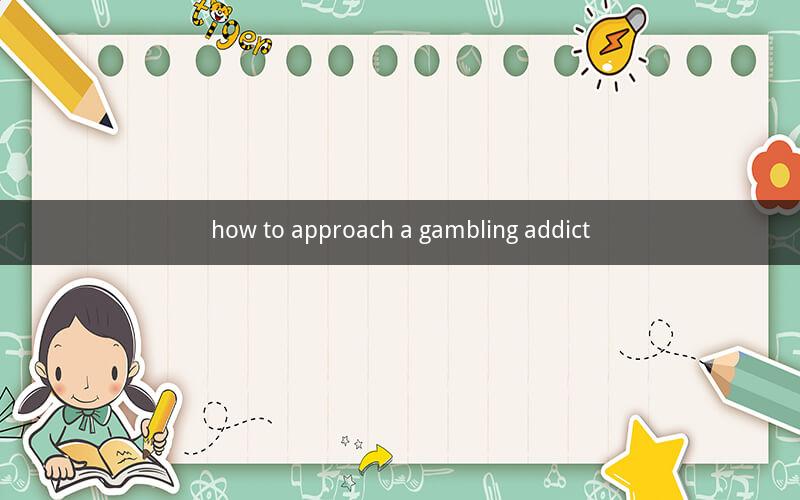
Table of Contents
1. Understanding the Problem
2. Identifying a Gambling Addict
3. The Importance of Education
4. Communication Strategies
5. Encouraging Professional Help
6. Support Systems
7. Setting Boundaries
8. Coping with Relapse
9. Promoting Healthy Habits
10. Long-Term Recovery
1. Understanding the Problem
Gambling addiction, also known as compulsive gambling, is a serious condition that affects individuals of all ages, genders, and socioeconomic backgrounds. It is characterized by an inability to control the urge to gamble, despite negative consequences. Understanding the nature of this addiction is crucial in approaching a gambling addict effectively.
1. Identifying a Gambling Addict
Recognizing the signs of gambling addiction is the first step in providing support. Common indicators include secretive behavior, increased financial strain, neglect of responsibilities, and a preoccupation with gambling. Look for patterns of behavior that suggest a potential addiction.
1. The Importance of Education
Educating oneself about gambling addiction is essential. Learn about the psychological and social factors that contribute to the development of this condition. Understanding the addiction's progression can help in creating a supportive environment for the addict.
1. Communication Strategies
Effective communication is key when dealing with a gambling addict. Approach the conversation with empathy and without judgment. Use "I" statements to express concerns, such as "I am worried about your gambling," rather than "You always gamble too much." Listen actively and encourage the addict to express their feelings and thoughts.
1. Encouraging Professional Help
Suggesting professional help is a critical step. Therapies like cognitive-behavioral therapy (CBT) have been shown to be effective in treating gambling addiction. Encourage the addict to seek help from a therapist or counselor specializing in addiction.
1. Support Systems
Support systems can significantly aid in the recovery process. Encourage the addict to join a support group, such as Gamblers Anonymous, where they can connect with others who share similar experiences. Family and friends can also provide crucial emotional support.
1. Setting Boundaries
Setting clear boundaries is important to protect both the addict and those around them. This may involve limiting access to gambling opportunities, monitoring financial transactions, and establishing consequences for non-compliance.
1. Coping with Relapse
Relapse is a common part of the recovery process. When a relapse occurs, it is important to remain supportive and non-judgmental. Help the addict analyze the triggers that led to the relapse and develop strategies to prevent future occurrences.
1. Promoting Healthy Habits
Encourage the addict to adopt healthy habits that can help mitigate the effects of gambling addiction. This may include regular exercise, a balanced diet, and sufficient sleep. Engaging in hobbies and activities that do not involve gambling can also be beneficial.
1. Long-Term Recovery
Long-term recovery from gambling addiction requires ongoing commitment. Support the addict in maintaining their recovery journey by checking in regularly, celebrating milestones, and providing encouragement.
---
10 Questions and Answers
Q1: What are the signs of gambling addiction?
A1: Signs include secretive behavior, financial strain, neglect of responsibilities, and a preoccupation with gambling.
Q2: How can I approach a gambling addict?
A2: Approach with empathy and without judgment, using "I" statements to express concerns.
Q3: What is the role of professional help in treating gambling addiction?
A3: Professional help, such as CBT, can provide effective treatment strategies and support.
Q4: How can I support a loved one with a gambling addiction?
A4: Support them by encouraging professional help, providing emotional support, and setting boundaries.
Q5: What are support groups for gambling addiction?
A5: Support groups like Gamblers Anonymous offer a community of individuals who share similar experiences.
Q6: How can I help someone avoid relapse?
A6: Help them analyze triggers and develop strategies to prevent future occurrences.
Q7: What are some healthy habits that can aid in recovery?
A7: Regular exercise, a balanced diet, sufficient sleep, and engaging in non-gambling hobbies.
Q8: How can I celebrate milestones in recovery?
A8: Celebrate milestones by acknowledging progress and expressing gratitude.
Q9: What is the importance of long-term commitment in recovery?
A9: Long-term commitment ensures ongoing support and maintenance of recovery.
Q10: How can I maintain communication with a recovering gambling addict?
A10: Maintain open, non-judgmental communication, checking in regularly, and offering support.